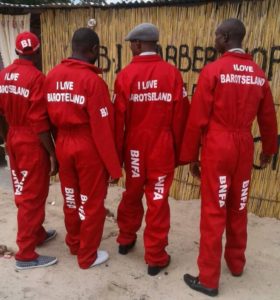Sinonge drags Mongu Police Commanding Officer to court—as Police deny BNFA another public meeting
by BNFA Publicity Wing
[caption id="attachment_4012" align="alignleft" width="140"] BNFA-BIs Regalia[/caption] On Wednesday April 4, 2018, Lutangu Sinonge, the firebrand BNFA Youth Chairperson who also doubles as the organisation’s National Publicity Coordinator, filed a legal suit against Mongu Police Officer Commanding Chipasha. Sinonge has accused Chipasha for prohibiting the Barotseland Imilemas, the BNFA youth wing, from wearing their newly acquired regalia on account that it is offensive to the police and it poses danger to public safety.
BNFA-BIs Regalia[/caption] On Wednesday April 4, 2018, Lutangu Sinonge, the firebrand BNFA Youth Chairperson who also doubles as the organisation’s National Publicity Coordinator, filed a legal suit against Mongu Police Officer Commanding Chipasha. Sinonge has accused Chipasha for prohibiting the Barotseland Imilemas, the BNFA youth wing, from wearing their newly acquired regalia on account that it is offensive to the police and it poses danger to public safety.
Sinonge contends that Chipasha used unpalatable language and intimidatory threats to the Barotseland Imilemas in particular and the people of Barotseland in general. Chipasha is reported to have retorted that as a “Bemba he would arrest” the Barotse Imilemas for displaying the symbol of crossed hands which he finds “extremely distasteful as it arouses public resentment against the state.”
On March 19, 2018, Sinonge was summoned to Chipasha’s office where he was interrogated and cautioned by four police officers, including Chipasha himself, about the regalia. The police wanted to know who, where and for what purpose the regalia were procured. Sinonge explained that the regalia were BNFA overalls (work entire) meant to create awareness about the imminent independence of Barotseland.
It was not easy to file the legal suit. Evidently, the judiciary system is structured so as to stop Barotseland nationals from raising any legal suit against the Zambian state. Consequently, Sinonge’s legal suit took days to get processed. At every stage the Principal Resident Magistrate (PRM) had to be consulted a process which was obviously approved for that purpose.
Meanwhile, police have today, April 5, 2018, denied BNFA permission to hold a public awareness meeting which was scheduled to be held on Sunday April 8, 2018 at Blue Gums grounds. There was drama at the Mongu police station when the activists handed notification papers on April 4, 2018. Evidently panic-stricken police officers ran from office to office consulting their superior what to do. An earlier attempt to lodge the notification was turned down on account of coming too early. When the police were denying the BNFA permission, they dared the activists to file another legal suit if they so desired.
BNFA have notified police several times to hold sensitization meetings following their participation at the Universal Periodic Review (UPR) for Zambia in Geneva on October 10, 2017. However, police have relentlessly denied the Barotse self-determination movement permission. The public order act only requires police to be notified about the intention to hold meetings, it does not provide for police denial of permission. However, Zambian organizations like Zambia Human Rights Commission have been allowed to make their own sensitization meetings with carefully selected Bemba and Nyanja participants without the requirement to notify the police.
BNFA calls on the people of Barotseland to fight for their right to self-determination. The right to self-determination is the right to determine our own destiny. The International Covenant on Civil and Political Rights allows us, as a people, to choose our own political status and to determine our own form of economic, cultural and social development. This is Barotseland’s only option after the unilateral abrogation of the Barotseland Agreement 1964.
We also have the right to public assembly. As people of Barotseland we have the right to meet and to work together in peace to defend our rights to self-determination. Further, we have the right to freedom of expression, that is, the right to make up our own minds, to think what we like, to say what we think, and to share our ideas amongst ourselves. The Zambia police have no authority to stop us from meeting and freely discuss amongst ourselves how we should manage our affairs as Barotse. The Zambia police have no authority to tell us what we wear.
 BNFA-BIs Regalia[/caption] On Wednesday April 4, 2018, Lutangu Sinonge, the firebrand BNFA Youth Chairperson who also doubles as the organisation’s National Publicity Coordinator, filed a legal suit against Mongu Police Officer Commanding Chipasha. Sinonge has accused Chipasha for prohibiting the Barotseland Imilemas, the BNFA youth wing, from wearing their newly acquired regalia on account that it is offensive to the police and it poses danger to public safety.
BNFA-BIs Regalia[/caption] On Wednesday April 4, 2018, Lutangu Sinonge, the firebrand BNFA Youth Chairperson who also doubles as the organisation’s National Publicity Coordinator, filed a legal suit against Mongu Police Officer Commanding Chipasha. Sinonge has accused Chipasha for prohibiting the Barotseland Imilemas, the BNFA youth wing, from wearing their newly acquired regalia on account that it is offensive to the police and it poses danger to public safety.